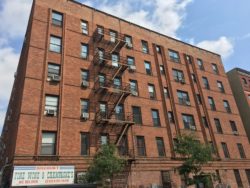
187 East 4th Street, Manhattan. Image credit: CityLand
East Village landlord improperly deregulated luxury apartment while receiving a City J-51 tax benefit. Until 1999, apartment 5M at 187 East 4th Street in Manhattan’s East Village was a rent-stabilized unit with a rent of $1,464 per month. When the apartment became vacant the owner, 72A Realty Associates L.P., installed new windows, closets, cabinets, countertops and other improvements totaling over $18,000 in costs. Based on the improvements, the owner obtained a J-51 real property tax abatement. At the same time the owner raised the rent by 20 percent based on the vacancy, and added an additional 1/40th of improvement costs. These increases raised the rent above the $2,000 threshold for decontrolling the apartment.
Tamara Jenkins leased apartment 5M in February 2000 for two years at the new monthly rent of $2,200. Jenkins renewed the lease several times with a final rent of $4,076 per month.
In 2014 Jenkins sued the owner, arguing that the apartment had been improperly deregulated in 2000. The Supreme Court found in favor of Jenkins, ruling that the owner had improperly decontrolled the apartment. The owner appealed.
The Appellate Division, First Department, affirmed that the owner had unlawfully decontrolled the apartment in 2000. An owner may not simultaneously take advantage of luxury decontrol laws while also receiving J-51 tax benefits. The First Department found that the owner was entitled to raise the rent to $2,200 in 2000, but not to decontrol the apartment. As a controlled apartment the rent over the following 17 years should have been based on that first lease rent of $2,200.
Taylor v. 72A Realty Associates, L.P., 151 A.D.3d 95 (1st Dep’t 2017).

